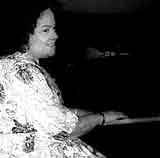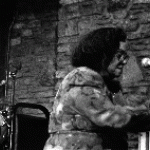pianist/singer; Probably the oldest Black woman musician working professionally in Austin. Has performed consistently since 1949. Austin native. Comes from one of the most influential family's in East Austin. Connected to Black society, government, education, real estate. East Side schools were named for her relatives, the Andersons. Grew up in the same neighborhood with the entertainment district. One of the families who fled the area after it went into decay. Left behind the family homestead and moved further east to Black suburbs. Has a colorful life story. Provides the only female point of view for the documentary collection at this point. Playing career includes coming up through the ranks of playing with blues, jazz and even Tex-Mex bands in her early years. From the 1950's she began mostly playing solo gigs as a "cocktail" pianist. Since that time has increasingly gotten more and more high status engagements. Has played for Texas governors, LBJ, city officials, west side high society, etc...Generally has steady work in the up-scale hotels. Has professional management, etc... She provides contrast because her's has not been a particularly "hard" time as a musician. In spite of the fact that she originally played the same honky-tonks that the other players played. Adds an additional dimension regarding how things might be different for Black women who primarily cater to up-scale white audiences. In terms of local east side cultural history, speaks from the point of view of one who witnessed the social demise of the neighborhood in which she grew up.

Ernie Mae Miller
Name: Ernie Mae Miller
Date of Birth: February 2, 1927
Location of Birth: Austin, Texas
Profession: Solo pianist
Instrument: Piano
Vocalist: Yes
Bands: Prairie View Coeds, Rhythm Kings, The Patterson Brothers, an unnamed Tex-Mex combo in the 1940's.
Discography: I'll be Home for Kwanzaa (2000)
Education: Anderson High School, Prairie View A and M University
Influences: Gospel music, Swing Era jazz musicians (Ellington, Basie, Lunceford et. al.)
Styles: Jazz, Blues, Standards
Venues: New Orleans Club, Radisson Hotel, Dinty Moore's, Flamingo Lounge, Jade Room, Jesterís Club, New Orleans Club, Longhorn Bar and Grill, Driskill Hotel.
Ernie Mae Miller is probably the oldest working Black female musician in Austin and has performed consistently since 1949. She is a member of one of East Austin's most influential families (Anderson high school is named for her grandfather, L.C. Anderson), well-connected in Black society, government, education, and real estate. Miller grew up in the same neighborhood that contained East Austin's vibrant entertainment district, but her family fled the area after it went into decay, moving further east to the new African American suburbs.
Miller's colorful life story provides the only female point of view in the documentary collection at this point. Her career has included playing with blues, jazz and even Tex-Mex bands, but since the 1950s she has mostly played solo engagements as a cocktail pianist in upscale hotels.
Her viewpoint is also unique to the project in that her life as a musician has not been particularly hard, despite the fact that she began her career in the same honky-tonks as the other players in the project. Having witnessed the demise of the neighborhood in which she grew up, she is also an authoritative voice on East Side cultural history.





Social Media